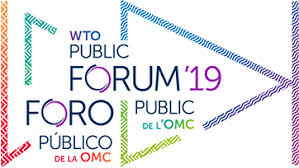Trade norms on access to the source code: What is the impact on trade in services and development?
10 Oct 2019 02:00h
Event report
[Read more session reports from WTO Public Forum 2019]
Ms Marilia Maciel (Digital Policy Senior Researcher, DiploFoundation) started by explaining how digitalisation has affected global trade. Many services have become tradeable and new business models have emerged, such as software as a service, platform as a service, and artificial intelligence (AI) as a service. Services rely on computer programmes, which, in turn, depend on the source code to function. Maciel mentioned that several trade agreements prohibit governments from requiring access to, and the transfer and disclosure of, the source code. A conflict of interest emerges between the protection of trade secrets and the legitimate public policy interests of states. She asked the panellists how the issue should be addressed, and how we can find a balance between private and public interests in WTO negotiations on the trade-related aspects of e-commerce.
Mr Michael Kende (Senior Advisor, Analysis Mason) explained the uniqueness of software – it is profoundly different from physical goods, because they can be easily copied. Kende went on to highlight how software is becoming increasingly embedded in physical goods and how algorithms are increasingly present in our daily lives. This creates a need for regulation by governments, to ensure the safety of the software. He elaborated the importance of an international governance approach to this issue, reminding the audience that it is common for governments and public authorities to get involved in case of a market failure. He said that the issues regarding e-commerce and cybersecurity need to be discussed at an inclusive platform.
Mr Quan Zhao (Trade Policy Advisor, International Trade Centre (ITC)) emphasised that there is so far no evident answer to determine the balance between public and private interests in trade agreements. He went on to share each side’s arguments. When it comes to private interests, providing access to the source code does not bring any profit to commercial actors. They are concerned that disclosure of the source code could undermine the security of the software as it could be targeted by hackers. The public interests to oversee and regulate the source codes are: to enhance consumer protections; to improve national security; and, to examine the integrity of AI and algorithms. As the line between private and public interests becomes increasingly blurred, Zhao said that regulatory agencies need forward thinking to predict and assess the impacts of digitalisation.
Ms Sanya Reid Smith (Legal Advisor and Senior Researcher, Third World Network) explained that proposals on restricting governments’ access to the source code applies to all WTO members, including developing countries, which could potentially hinder their rights to development. She also pointed out that existing WTO instruments, such as the Trade-Related Aspects of Intellectual Property Rights (TRIPS) and TRIPS Plus, protect intellectual property rights, including the source code. Smith said that public authorities can test the safety and integrity of the source code only when the source code is open to the public. As digitalisation impacts all aspects of our lives, she highlighted that open access to the source code is inevitable to ensure safety and security.
In conclusion, while questioning whether the WTO is an appropriate platform to lead the debate, the panellists said that the organisation needs to find a way to harmonise the interests of the private and public sectors.
Related topics
Related event

